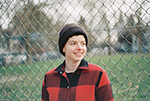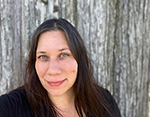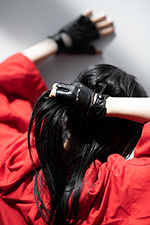2 weeks left to submit!
Kayla Czaga,
Open Season Poetry judge
 Past contributor Curtis LeBlanc talks with the Open Season Awards poetry judge about writing from your own experiences, the importance of voice, and finding humour in truth. Past contributor Curtis LeBlanc talks with the Open Season Awards poetry judge about writing from your own experiences, the importance of voice, and finding humour in truth.
CL: Humour is everywhere in contemporary poetry, but there seems to be a divide between sincerity and irreverence—each being used to their own desired outcomes—in its usage. I think your poems are funny, and I also find them to be incredibly sincere. How does humour factor into accessing emotional honesty in your writing practice?
KC:
I don’t believe sincerity and humour are mutually exclusive. As we mourned, my mother and I often made fun of my father, as a way of remembering him, laughing and crying at the same time. I would be deeply offended if someone didn’t make a joke at my funeral. Most of the time, I am trying to create a speaker who sounds somewhat like me, so being able to balance humour and darkness without having the sentiment too too far one way or the other is very important.
Another thing I noticed is that I don’t always know when I’m being funny. There have been a few times at public readings I’ve been surprised by audience laughter. Sometimes people find the truth very funny.
Read the rest of Kayla Czaga's interview.
Odette Auger, issue #224
cnf contributor
 Past contributor Jaymie Campbell talks with the fall issue #224 cnf contributor about loaded comments, centring lesser-heard voices, and recognizing the strength of our earliest personalities. Past contributor Jaymie Campbell talks with the fall issue #224 cnf contributor about loaded comments, centring lesser-heard voices, and recognizing the strength of our earliest personalities.
JC: Writing can often be a form of healing, with storytelling being so integral to Indigenous culture. I get the sense from this piece that you are writing to your younger self. What would you say not only to yourself, but to other readers with stories of waiting if you could speak to that young girl in the backseat?
OA:
I’ve heard this is a counselling technique, recognizing the child-self and connecting to those parts of ourselves. For me, that came up during an abusive moment. I literally couldn’t understand how this was happening, saw myself very much the same person at core as when I was in grade 2—and why would anyone want to hurt that girl? It was a clarifying moment.
Recognizing the strengths, quirks, and heart of our earliest personalities—growing doesn’t need to mean ditching that. I think we can remind each other to draw strength from those parts of who we are.
Read the rest of Odette Auger's interview.
Kawai Shen, issue #224
fiction contributor
 Past contributor T. Liem talks with the fall issue #224 fiction contributor about ecosystems of creativity, the different types of power imbalances in her story, and what we choose to perceive or ignore about people. Past contributor T. Liem talks with the fall issue #224 fiction contributor about ecosystems of creativity, the different types of power imbalances in her story, and what we choose to perceive or ignore about people.
TL: Contemporary sociopolitical issues are simmering in the background of “The Hanged Man.” We hear about Eunice’s work with an Asian Canadian arts collective, we see the commodification of spiritual practices in the store The Eighth Dimension, and Eunice’s mother, Evelyn, mentions a store where they sell “jade facial rollers for fifty dollars.” Would you talk about why the conversations between characters about these kinds of things are important to the story?
KS:
I included these conversations to help the reader map out the power dynamics between all the characters. They reveal not only how each character understands systems of social power but also how they speak (or don't speak) about such matters to the other characters. I'm also asking the reader to consider how impersonal power structures like white supremacy can foreclose how we conduct ourselves in intimate relationships. Who we are attracted to and why. How we care for or exploit each other. What we choose to perceive or ignore about people.
When it comes to analyzing intimate relationships, we have a tendency to rely on individual psychology, models like attachment theory and so on. What about other forces that compel us to act in certain ways? I think we're starting to see a growing recognition of a disjuncture between character-driven narratives and how the majority of people are experiencing their lives during a cost-of-living crisis and climate crisis. We could argue the main character that's driving almost everyone's story today is a dehumanizing global system of capitalist exploitation.
Read the rest of Kawai Shen's interview.
|
|
|
|
|
|
|
|